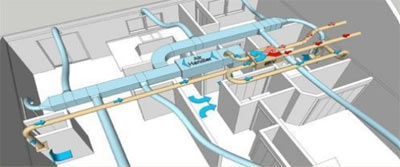HVAC Good Duct Design
Credit: 2 PDH Hours
Course Fee: $24.00
9 pages
How it Work!
- Register first and log into your account. Study and take the quiz for FREE until passed.
- After passing the quiz, follow the page, pay for the course and print your certificate.
Course Summary:
The efficiency of air distribution systems has been found to be 60-75% or less in many houses because of insufficient and/or poorly installed duct insulation and leaks in the duct system. Properly designed and installed duct systems can have efficiencies of 80% or more for little or no additional cost, potentially saving a homeowner $50-200 or more per year in heating and cooling costs. Moreover, efficient duct system designs can reduce equipment size, further saving money for new or replacement equipment.

Duct systems that leak and/or do not distribute air properly throughout the house may make some rooms too hot and others too cold. Leaky and unbalanced duct systems may force conditioned air outside and unconditioned air into the house. This increases heating and cooling costs and may also draw humidity, dust, mold spores, and other contaminants into a home from the attic, crawlspace, or garage and radon gas from the soil. In extreme cases, poorly designed and installed duct systems can induce back drafting spillage of flue gases from combustion appliances (e.g., furnace, water heater, fireplace) into the living space primarily when atmospheric or natural-draft flues are used rather than powered combustion systems.
Learning Objective:
The objectives of good duct design are occupant comfort, proper air distribution, economical heating and cooling system operation, and economical duct installation.
The objectives of good duct design are occupant comfort, proper air distribution, economical heating and cooling system operation, and economical duct installation. The outcome of the duct design process will be a duct system (supply and return plenums, ducts, fittings, boots, grilles, and registers) that
- Provides conditioned air to meet all room heating and cooling loads.
- Is properly sized so that the pressure drop across the air handler is within manufacturer and design specifications.
- Is sealed to provide proper air flow and to prevent air from entering the house or duct system from polluted zones.
- Has balanced supply and return air flows to maintain a neutral pressure in the house.
- Minimizes duct air temperature gains or losses between the air handler and supply outlets, and between the return register and air handler.
Review the quiz before studying the course.
Course Content
Course Author: DOE
Certificate of completion of the course
This course comes with a multiple-choice quiz. You can view the quiz and take the quiz if you are logged in your account. You can take the quiz for this online PDH course as many times until passed. The passing grade is 70% and above. After you pass the quiz simply follow the page, to pay for the course and print your certificate instantly. A copy of the certificate and receipt for this course will always be in your account.
This online PDH course can also be used as a continuing education course for the following.
